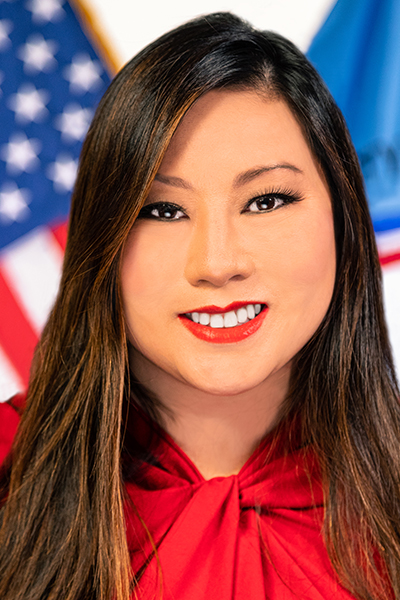In a bombshell declaration, CFTC Commissioner Caroline Pham says the regulator has expanded its jurisdiction and strayed from its mission. She wants the GAO to step in.

Grygo is the chief content officer for FTF & FTF News.
Caroline D. Pham, a Commodity Futures Trading Commission (CFTC) commissioner, started the Open Meeting on May 10 with a bang — she wants the U.S. Government Accountability Office (GAO) to investigate the CFTC because she thinks the regulator has expanded its jurisdiction without a proper mandate, and, as a consequence, has strayed far from its mission.
Pham detailed her concerns in a statement later posted online, “The CFTC Needs to Get Serious: A Strategic Plan for Reform.”
She began by challenging the CFTC’s ban on “event contracts,” which are derivatives contracts using elections, awards, or sports competitions as the basis for the contracts. The CFTC “will take yet another step down a misguided path that encroaches so far onto States’ rights that it makes a mockery of the Tenth Amendment,” Pham says.
Despite the good intentions, that decision is a prime example of where the CFTC has gone wrong, she says.
So, she wants a GAO audit of the CFTC’s “procedures for rulemaking, examinations and compliance reviews, investigations and enforcement, adjudicatory proceedings, due process protections, and compliance with the CEA, APA, Good Accounting Obligation in Government Act, Government Management Reform Act of 1994, Government Performance and Results Act (GPRA) Modernization Act of 2010, and other laws and requirements applicable to administrative agencies” — basically everything the CFTC does.
 Pham says that a GAO review and recommendations would improve “internal operations, structure, technology, expertise, personnel, and funding” needed for the oversight of commodity derivatives markets. “The Commission must be able to walk in a straight line before we run headlong into any expansion of jurisdiction,” she says.
Pham says that a GAO review and recommendations would improve “internal operations, structure, technology, expertise, personnel, and funding” needed for the oversight of commodity derivatives markets. “The Commission must be able to walk in a straight line before we run headlong into any expansion of jurisdiction,” she says.
Citing her time as a senior compliance officer in the private sector, Pham says that it was her job “to implement policies and procedures, controls, monitoring, testing, and assessment to achieve compliance with laws and regulations to ensure safety and soundness of the bank and market integrity and conduct.” She also had to spotlight major problems.
“These responsibilities might not always be popular — as anyone familiar with compliance and internal audit are aware,” she adds. “Now that I’m a commissioner, it’s still my job to say something if I see something wrong. And it’s what the CFTC expects of its registrants.”
The commissioner is raising concerns about:
- The lack of procedures;
- Improper expansion of jurisdiction;
- Incorrect application of the law;
- Increased delegation of authority;
- Dubious enforcement actions and unfair adjudicatory proceedings;
- Failure to comply with the APA; and
- General disregard for due process.
“I’ve had to use my voice not only because it’s my job as a Commissioner, but out of true devotion to an agency that I have loved and cared about so much that I’m back for the fourth time. The CFTC is where I started my career, and I believe deeply in our mission and our people,” Pham says.
“Like a mom who will always hold her kids to a high bar and push them to reach their potential, I want to see us all succeed. That means not being afraid to look inward, seek guidance, and be honest with ourselves about our missteps. The most important leadership lessons I’ve learned is to never be complacent, have a growth mindset, embrace diverse viewpoints, and focus on continuous improvement,” she adds.
Pham, who previously served at the CFTC from 2009 to 2014, also worked at the SEC and the Office of the Comptroller of the Currency (OCC).
Looking to history, she notes that the SEC’s “greatly expanded jurisdiction over new products and categories of registrants,” came about because of the Dodd-Frank “studies, reviews, and reports” that prepared the SEC to take on new oversight responsibilities.

Caroline D. Pham
“But there was no similar Dodd-Frank mandate to improve management at the CFTC,” Pham says. “Now in the present day, the CFTC may potentially have its jurisdiction expanded again and is facing a new wave of technological developments like crypto assets and generative artificial intelligence (AI). It’s time for the CFTC to finally have the benefit of comprehensive studies and recommendations to make sure we are prepared and able to carry out our mission.”
A GAO study would ultimately provide “a roadmap for implementation of reforms,” she says.
She concedes that “some of my statements and staff questions as a commissioner haven’t always been popular. … My objective has always been for the commission to excel at its mission to promote market integrity, and to avoid embarrassment and the degradation of our reputation as a leading regulator.”
FTF News contacted CFTC and GAO media representatives to get their responses to Pham’s statement.
CFTC officials decline to comment.
A GAO spokesperson says the next move is up to the U.S. Congress.
“We appreciate the suggestion. However, we do our work specifically at the request of Congress. So should we receive a request like this from Congress, we would then certainly consider starting such work. GAO has broad authority to audit federal agencies and programs, including CFTC,” Chuck Young, managing director, public affairs for the GAO, tells FTF News.
Pham’s full statement can be found here: https://bit.ly/44R8yPN
Need a Reprint?